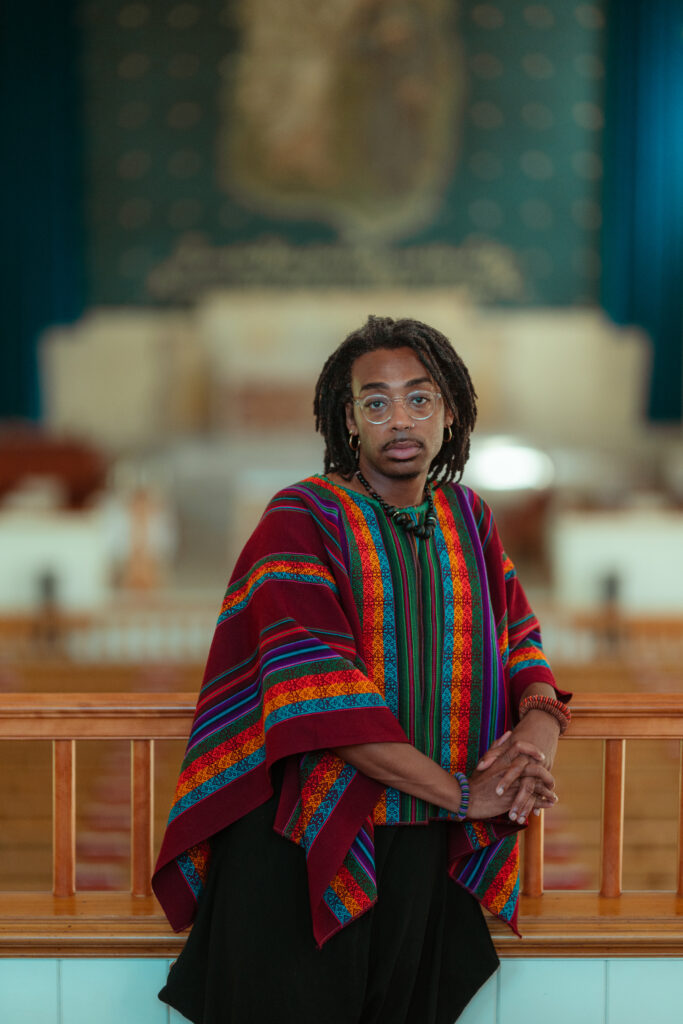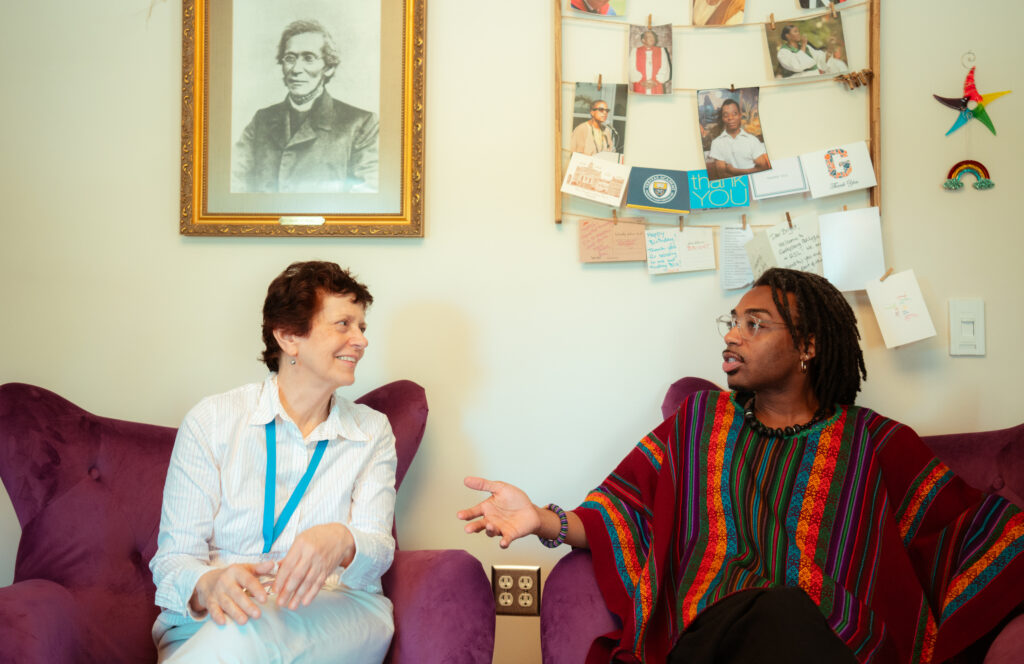Radical Hospitality—Bright’s Vision for Religious and Spiritual Life
By George Malian, Magazine Editor

Chaplin Bright in the Chapel (Photo Borna Ganji/The Gettysburgian).
On March 7, Gettysburg welcomed Michael Bright—known simply as Bright— as the college’s new chaplain.
Like anyone known by only one name, Bright brings a distinct character to his role. Carrying with him a buoyant energy and keen sense of style, he offers a liveliness unfamiliar to the Center for Religious and Spiritual Life.
A graduate of Lancaster Bible College and Lancaster Theological Seminary, he arrived in Gettysburg after serving as the Residential Coordinator for Diversity, Equity, and Inclusion Initiatives at Franklin & Marshall College.
According to Bright, serving as a college chaplain “has been a dream come true” and has realized his longtime desire to work “with spiritual religious life, in an education environment, doing spiritual and religious education.”
The son of father who worked as a combat camera man in the U.S. Army and a mother who works in optometry, he was born in Baltimore and spent his childhood in Maryland. From a young age he knew that he was meant to be a preacher.
“I remember being three or four years old on a Sunday in my grandmother’s kitchen and we had gotten home from church. And I remember I couldn’t read yet, but I had a dictionary in my hand and I was pretending to be a preacher” he said, adding that he knew “it was just something that I was always going to do.”
Growing up as a National Missionary Baptist, Bright attended the First Christian Community Baptist Church of Baltimore and now identifies, spiritually, as a Black American Christian and attends City of Refugee East in Lancaster. Among the photographs of James Baldwin and Toni Morrison hanging in his office is a picture of Rev. Dr. Yvette Flunder, the presiding bishop of City of Refuge—a member of the Fellowship of Affirming Ministries that describes itself as “radically inclusive” after being founded in the outgrowth of the AIDS crisis.

Chaplin Bright and Program Coordinator Carla Pavlik in the Center for Religious and Spiritual Life (Photo Borna Ganji/The Gettysburgian).
In the spirit of his own religious journey, Bright seeks to make Gettysburg College a more tolerant place. Among his first priorities as chaplain is deconstructing white religious privilege on campus.
After learning more about the College’s own history with religious diversity, he feels that it is important for all students to feel a sense of belonging. Bright observes, how previously, “there was a major Jewish presence on campus and there were Jewish students that felt that they could not be public about their Jewish identity.”
In an atmosphere that has long been dominated by white Christians, he aims to foster the spirituality of students who may have been marginalized in the past.
Noting the formation of both Hillel and the Muslim Student Association, he believes that he was brought here to continue that growth.
“If I’m going to be bold and courageous in feeling free and empowered enough to take this job, I also need to be able to bring a whole self to it so that students who otherwise have never thought about faith, or have never thought about meaning in their life, or have never thought about religion, that have been curious about those things or have been hurt by those things, can see a person like me and know there is room for me in this community,” he said.
For Bright, building an interfaith community is a task he approaches with intense seriousness.
Bright said, “Nobody sniffs out a fake faster than religious people. So the superficial change, I don’t think in terms of me being a part of it, I can do. I’m not a superficial person. Because of how I do things, we’re gonna do it for real. I believe in a real Jesus. This is not a fake out for me. I’m a real theologian, I really believe in a real creator god who is interested and involved in what goes on here in our world and I’m meaning to give people access to that in a way that they haven’t before.”
Assisting in this vision is Carla Pavlik, the Program Coordinator for the Center for Religious and Spiritual Life and International Student Services.
Pavlik believes that it is the Center for Religious and Spiritual Life’s job to provide a “welcoming environment for all students, staff, faculty, and administrators from all faiths and for people who don’t identify with any faith but are looking for spiritual growth and guidance.”
Over the course of this year, the Center for Religious and Spiritual Life plans on holding several retreats and looks forward to taking part in major ceremonies like convocation, commencement, and Spring Honors Day in addition to guiding religious student organizations like Hillel, the Newman Association, and DiscipleMakers. Bright will also be hosting weekly prayer for members of the campus community on Wednesday afternoons in the Center for Religious and Spiritual Life’s office on West Stevens Street.
“Our real goals are to practice radical hospitality and create an environment for religious and spiritual solidarity. A lot of times our faith is enhanced by the faith of those around us and that doesn’t necessarily mean they come from the same tradition. But when I make all the room in the world for you to embrace your faith, that means that I also have room to embrace my faith as well. It’s that it’s creating an environment for understanding healthy conversations, friendships, and meaningful connections,” Bright said.
Pavlik remarked that working with Bright has “been really exciting and rewarding,” adding that the two “laugh a lot, which is wonderful to have. To have a supervisor who you can laugh with” and that she thinks they have “very common goals and hopes for the college community.”
When asked why he chose to come to Gettysburg, Bright said, “I really sensed that God was calling me to lead and serve in this community. I think the college itself serves to redefine sort of what this town is good for and has been known for. And I believe that me coming here is a part of that work.”
This article originally appeared on pages 12–13 of the September 2022 edition of The Gettysburgian’s magazine.

October 18, 2022
As a G-burg student during the 1970s when the Rev. John Vannorsdall was chaplain, I was privileged to serve on the Chapel Council where I met lifelong friends to this day. The hiring & presence of Bright at Gettysburg gives one confidence in not only the incremental progress that Gettysburg has made in terms of hiring staff who look like their students, but reaffirms the uplifting role that spirituality plays in making life worth living. It does so when the person serving as College Chaplain is an advocate for faith of whatever origin, promotes the ongoing presence of God in all communities of faith, and conducts themselves with a welcoming grace that invites all to share their respective faith journeys with each other so that myths can be dispelled while religious tolerance is simultaneously reinforced. (PS: From afar, I’m glad that the Chaplain, in his youth, held up that dictionary and followed that path).